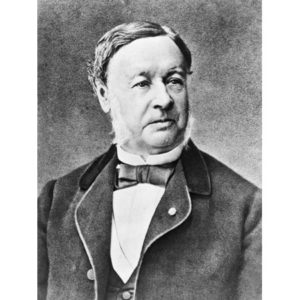
Theodor Schwann (1810 – 1882) was a German physician and physiologist who proposed the cellular nature of all living things. Along with Matthias Schleiden, Schwann laid down the foundation to Cell Theory.
Schwann was born in Neuss, Germany, attended a Jesuit school in Cologne, enrolled in the University of Bonn, transferred the the University of Wurzburg for clinical training in medicine before he finally moved the the University of Berlin where he obtained his M.D. degree. Much of his moving involved him following physiologist Johannes Muller, a leading physiologist of his time.
After he graduated he began to make a series of discoveries. In 1835 he discovered the enzyme Pepsin. Next he performed experiments with yeast and fermentation. He successfully demonstrated that fermentation was an organic process; that living yeast was necessary to produce more yeast.
Schwann’s most important work was in the development of Cell Theory. He began by taking the idea that all plants are made from cells and extended them to animals. In 1838 Schleiden published Contributions to our Knowledge of Phytogenesis, outlining his theories of the roles of cells in plant development. This influenced Schwann and the next year he published Microscopical Researches into the Accordance in the Structure and Growth of Animals and Plants, a landmark work where he proposed his own Cell Theory. In it he exclaimed ” “All living things are composed of cells and cell products”, extending Schleiden’s idea that new plant cells are formed from old plant cells to the domain of animals. He also coined the term “metabolism” to describe chemical reactions taking place within the cell.
Cell Theory and his work on yeast and fermentation provided strong evidence against the idea of spontaneous generation – the idea that living organisms could develop from nonliving matter. This won him tremendous respect from his peers. In 1879 Schwann was elected to both the Royal Society and to the French Academy of Science. He died three years later.